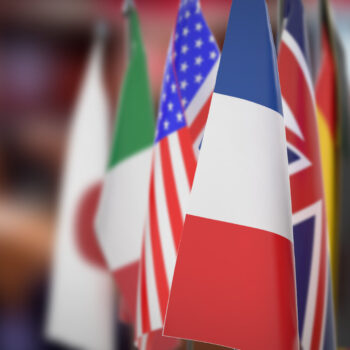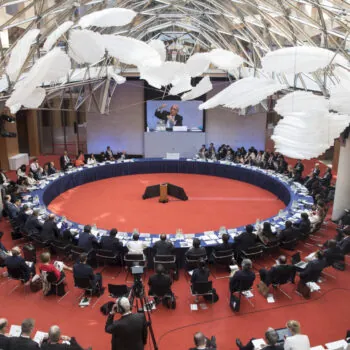With Europeans occupied with wrapping up domestic processes ahead of the upcoming European elections and the corresponding changing of the guard across the European institutions, it is easy to lose sight of the international expectations placed on Europe when it comes to climate change.
In the wake of the IPCC 1.5 report’s unsettling findings and another year of climate impacts for citizens in Europe and across the globe – the message is clear – the consequences of climate change will wait for no (wo)man or election. And as the UN Secretary-General Antonio Guterres calls on heads of state to deliver tangible commitments to increase climate action at his September climate summit, the EU and its member states will once again be in the spotlight to deliver on the promise of European climate leadership.
Europe has for a long time been expected by international partners to act as one of the leaders on the international stage. However, since 2017, when the Trump government announced its intention to withdraw from the Paris Agreement, heightened expectations on Europe have become a mainstay of the climate diplomacy landscape. And for the most part Europe has been so far able to step up to the mark, emerging as a bulwark for multilateralism and champion of the Paris Agreement on the international stage. Most recently at COP24:
- the EU delegation acted as bridge builder in the final days of rulebook negotiations,
- the European Commission put forward the first vision of a major economy’s pathways to carbon neutrality by 2050, and
- the EU and several individual member states (Denmark, Finland, France, Germany, Italy, Luxembourg, Netherland, Portugal, Spain, Sweden and the UK) signed on to a declaration stating their determination to step up climate ambition by 2020.
But if you make the unravelling climate crisis your marker, it is clear that countries barely scraped by at COP24: delivering a functional Rulebook for the Paris Agreement but failing to come prepared to commit to accelerating climate action. The vision for a carbon neutral Europe is, for now, just that – a vision. This vision will need to be transformed into a firm commitment on what direction to take and policies to adopt. High ambition declarations need to be followed-up with concrete announcements of increased climate targets and action on the ground in order to remain credible.
Europe is aiming to address the former – with efforts underway to agree on a climate neutral EU by mid-century and design a set of transformative policies and actions. But EU legislators should also not lose sight of necessary near-term changes. The very actions that will make a 2050 vision credible, to international allies and European citizens alike. European leaders must demonstrate they are not only planning for but dealing with a world where European citizens are already experiencing the realities of climate change.
Here the September Secretary General’s Climate summit offers European leaders an opportunity to deliver tangible commitments to start fulfilling the vision of a climate-neutral Europe. The UNSG has already made it clear that only the most concrete and transformative outcomes will be welcome at the Summit. Plans are already in place for a vetting meeting in the early summer of 2019, during which the outcomes to be featured will be selected. With numerous European member states already being tapped to facilitate diplomatic conversations around the summit’s key thematic strands it is clear that the EU, or at least its member states will once again be in the spotlight.
Now the great temptation is to trot out another, slightly more formalized version of the 2050 strategy by the UNSG summit. However, this would prove fatal to the credibility of the EU as an actor taking the emerging climate crisis seriously – both amongst its international partners and EU citizens. Internationally, the clearest message to come out of last year’s Talanoa Dialogue was that we are all not doing enough, and urgent global action needs to be taken to close the gap. At the same time the IPCC report has shown that immediate action – particularly ahead of 2030 – will determine whether a well-below 2, let alone a 1.5, aligned pathway stays in reach.
Add to that the unavoidable fact that the EU is currently the pace setter on climate change and it is clear: If Europe does not commit to do more ahead of the first Paris ambition cycle in 2020 – then neither will major economies and partners like China or India.
At the same time, appetite amongst EU citizens is growing for action now, not sometime by 2050. This appetite is given a particularly clear voice in the form of the tens of thousands of students that have taken to the street across Belgium, the Netherlands, and Germany, to name a few.
In this context, the UNSG summit becomes a moment to make a cleaner, safer Europe more tangible and credible both domestically and internationally. The European Union and its member states can do this not by defaulting to a far-off vision of the future – but by taking concrete steps to start closing the gap:
- Europe should bank existing climate progress and bring itself on a firmer path to carbon neutrality by announcing it will review its 2030 targets (and NDC) with a view to updating in 2020. In deciding to work towards this announcement by the UNSG summit sooner rather than later, Europe has a credible hand in discussing potential joint announcements with other major economies similarly on track to overachieve their climate targets such as China and India. A move which not only has the potential to make a difference in the efforts to close the emissions gap but also builds confidence in major economy’s commitment to the Paris ambition mechanism.
- However, as Paris ambition mechanisms rarely resonate with the audience at home, European member states should also use the summit to announce concrete climate initiatives. These initiatives are the moment to start filling a vision of a net-zero European future with life and show European citizens what climate neutral societies and economies entail. Amongst other things these could include:
- joint commitments to phase out European coal, ending coal financing abroad, and instead channelling finance towards sustainable infrastructure investments;
- Collective agreement of end-dates for combustion engine vehicles;
- Announce joint investment initiatives in clean mobility and electric vehicles infrastructure;
- commit to fully Paris-align European financial flows and phase-out fossil fuel subsidies, including through fully implementing the Sustainable Finance Action Plan across European member states.
With the choppy geopolitical waters of 2020 on the horizon, why not seize the moment of the UNSG summit to make European commitment to climate action more real and more credible to citizens and allies alike?


